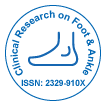Notre groupe organise plus de 3 000 séries de conférences Événements chaque année aux États-Unis, en Europe et en Europe. Asie avec le soutien de 1 000 autres Sociétés scientifiques et publie plus de 700 Open Access Revues qui contiennent plus de 50 000 personnalités éminentes, des scientifiques réputés en tant que membres du comité de rédaction.
Les revues en libre accès gagnent plus de lecteurs et de citations
700 revues et 15 000 000 de lecteurs Chaque revue attire plus de 25 000 lecteurs
Indexé dans
- Google Scholar
- Sherpa Roméo
- Ouvrir la porte J
- Clés académiques
- Recherche de référence
- Université Hamdard
- EBSCO AZ
- OCLC-WorldCat
- Publons
- Fondation genevoise pour l'enseignement et la recherche médicale
- Euro Pub
- ICMJE
Liens utiles
Revues en libre accès
Partager cette page
Abstrait
The Effects of off-the-Shelf Foot Orthoses on the Quality of Life of Patients Diagnosed with Early Rheumatoid Arthritis
Derek Santos
Background: Rheumatoid Arthritis (RA) is a chronic and progressive disease that is reported to affect the foot in about 90% of cases. Off-the-shelf foot orthoses are widely used to treat patients with early RA because they are cost-effective but more evidence on their clinical effectiveness is required. This study aims to strengthen the current evidence for off-the-shelf foot orthoses.
Methods: Thirty-five patients participated in the study (mean age (SD) was 52.4 (13.3) years). None of the participants had received foot orthoses or had contra-indications to their use. Participants were excluded if they suffered from concomitant musculoskeletal disease, endocrine disorders, and neurological disease. For the within subject controlled study design, data was collected at baseline, three months and six months. A biomechanical assessment was carried out at baseline and the chair-side customized off-the-shelf foot orthoses supplied. Every patient completed the Leeds Foot Impact Scale (LFIS) questionnaire at each visit.
Results: For LFISif subscale there was statistical significance between baseline and three months (p=0.000) and baseline and six months (p=0.000). Similar results were also found for LFISap between baseline and three months (p=0.001) and baseline and six months (p=0.000).
Conclusion: This study suggests that cost-effective off-the-shelf foot orthoses are effective in the management of early RA patients. Patients may expect to see an improvement in QOL by three months with a further improvement by 6 months. This positive effect on QOL is also clinically significant provided patients wear their orthoses for at least six months.
Revues par sujet
- Agriculture et Aquaculture
- Biochimie
- Chimie
- Food & Nutrition
- Génétique et biologie moléculaire
- Géologie et sciences de la Terre
- Immunologie et microbiologie
- Ingénierie
- La science des matériaux
- Le physique
- Science générale
- Sciences cliniques
- Sciences environnementales
- Sciences médicales
- Sciences pharmaceutiques
- Sciences sociales et politiques
- Sciences vétérinaires
- Soins infirmiers et soins de santé
Revues cliniques et médicales
- Allaitement
- Anesthésiologie
- Biologie moléculaire
- Cardiologie
- Chirurgie
- Dentisterie
- Dermatologie
- Diabète et endocrinologie
- Gastro-entérologie
- Immunologie
- La génétique
- Maladies infectieuses
- Médecine
- Microbiologie
- Neurologie
- Oncologie
- Ophtalmologie
- Pédiatrie
- Recherche clinique
- Soins de santé
- Toxicologie

 English
English  Spanish
Spanish  Chinese
Chinese  Russian
Russian  German
German  Japanese
Japanese  Portuguese
Portuguese  Hindi
Hindi